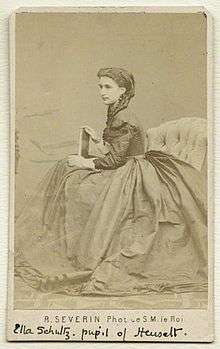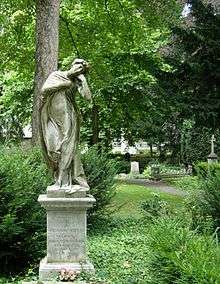Ella Adayevskaya


Ella Georgiyevna Adayevskaya (Russian: Элла (Елизавета) Георгиевна Адаевская; 22 February 1846 [O.S. 10 February] – 26 July 1926) was a Russian composer, pianist, and ethnomusicologist.
Adayevskaya wrote vocal music (including choral works), chamber music, and two operas. She also edited a collection of Italian songs and published writings on folk music and the music of ancient Greece.
Life
Born in St. Petersburg on 22 February 1846 as Elizaveta/Elisabeth von Schultz, as the daughter of the prominent Estophile of Baltic German heritage Georg Julius von Schultz[1]. Adayevskaya began learning the piano in childhood. Amongst her teachers were Adolf von Henselt, Anton Rubinstein and Alexander Dreyschock. She studied composition with Alexander Famintsyn and Nikolai Zaremba. Adayevskaya was a pseudonym derived from the notes A, D, and A, played by the kettledrum in Mikhail Glinka's opera Ruslan and Ludmila.[2]
Her earliest works include choruses written for the Russian Imperial Chapel Choir.[2] In the 1870s she wrote two operas. The first, titled Neprigozhaya (The Ugly Girl) (in the composer's German manuscript Salomonida, die Tochter des Bojaren, Salomonida, The Boyar's Daughter), was a one-act piece written in 1873.[3] The more ambitious Zarya (Dawn, German title Die Morgenröte der Freiheit (The Dawn of Freedom) ) followed in 1877; this four-act work was dedicated by the composer to Tsar Alexander II, but was rejected by the censor.[4] Later, she embarked on several solo concert tours of Europe and settled in Venice in 1882. In 1881, she composed her Greek Sonata for clarinet and piano, which used quarter tones.[2] In Italy she collected national songs, among others songs of the people of the Raetia region in quintuple metre.[5]
In 1911 she moved to Neuwied where was associated with the circle of the poet Carmen Sylva and published many articles on folk music.[2]
Adayevksaya died in Bonn in 1926. She was buried in the Alter Friedhof, Bonn.
Works
Operas
- Neprigozhaya (The Ugly Girl), 1873
- Zarya svobody (The Dawn of Freedom), 1877
Vocal music
- Yolka (The Fir Tree), cantata, c. 1870; also
- other choral works, songs
Chamber music
- Greek Sonata for clarinet and piano, 1881
- piano pieces
Notes
References
- Brown, Malcolm Hamrick (n.d.). "Adayevskaya [née Schultz], Ella Georgiyevna." in Oxford Music Online, accessed 22 January 2016. (subscription required)
- Eaglefield-Hull, A. (1924). A Dictionary of Modern Music and Musicians London: Dent.
- Hüsken, Renate (2005). Ella Adaïewsky (1846-1926): Pianistin – Komponistin – Musikwissenschaftlerin. Cologne: Dohr. ISBN 3-936655-18-9.
- Schultz-Adaïewsky E. Morgenröte der Freiheit. Volksoper in vier Akten. Klavierauszug. Nach dem Autograf bearbeitet und herausgegeben von Denis Lomtev. – Lage (Westf.): BMV Robert Burau, 2015.
External links
| Wikimedia Commons has media related to Ella Adaïewsky. |